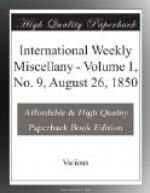* * * * *
M. Max Schlesinger, author of “The War in Hungary, in 1848-9,”—a work which, from what we read of it in the foreign journals, is much the most striking and attractive of all that have appeared upon its subject in English,—is described in the Athenaeum, as by birth a Hungarian, by the accidents of fortune a German. For some time a resident in Prague, and more recently settled in Berlin, he has had excellent opportunities of seeing the men and studying the questions connected both in the literary and political sense with the present movement of ideas and races in Eastern Europe. His acquaintance with the aspects of nature in his native land—his knowledge of the peculiar character of its inhabitants, their manners, modes of thought and habits of life—his familiarity with past history—his right conception of the leading men in the recent struggle—are all vouched for as “essentially accurate” by no less an authority than Count Pulszky. It would be an injustice merely to say that M. Schlesinger has given in an original and picturesque way a general view of the course of events in the late war, more complete and connected than is afforded in any account hitherto presented to the public. He has done more: he has enabled the German and English reader to understand the miracle of a nation of four or five millions of men rising up at the command of a great statesman, and doing successful battle with the elaborately organized power of a first-class European state, shaking it to its very foundations, and contending, not without hope, against two mighty military empires,—until the treachery from within paralyzed its power of resistance.
* * * * *
Dr. Mayo’s new novel, “The Berber, or the Mountaineer of the Atlas,” published by Putnam, promises to be scarcely less popular than his “Kaloolah.” The Evening Post says of it: “Kaloolah was a sprightly narrative of the wanderings of a Yankee, who seemed to combine in his person the characteristics of Robinson Crusoe with those of Baron Munchausen; but the Berber professes to be nothing more than a novel; or, as the author says in his preface, his principal object has been to tell an agreeable story in an agreeable way. In doing so, however, an eye has been had to the illustration of Moorish manners, customs, history, and geography; to the exemplification of Moorish life as it actually is in Barbary in the present day, and not as it usually appears in the vague and poetic glamour of the common




